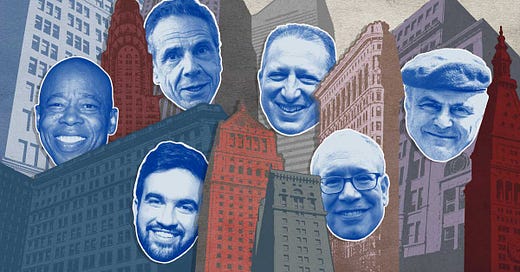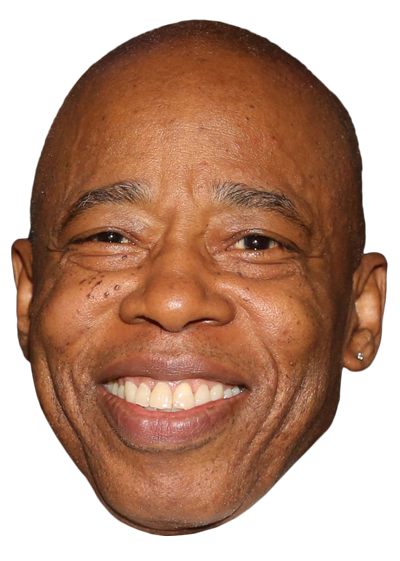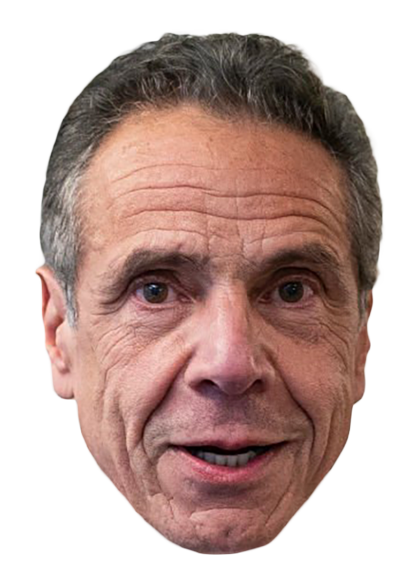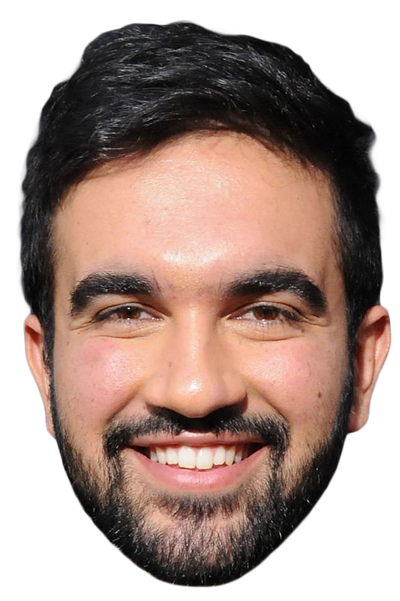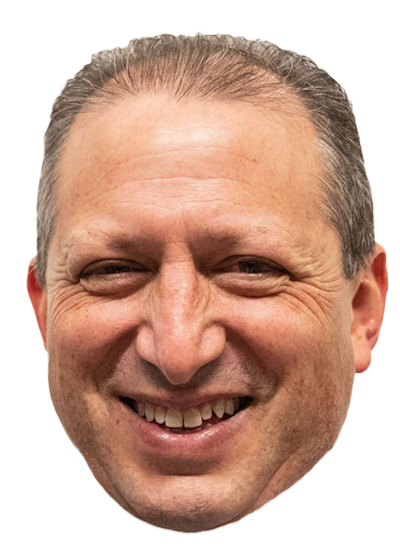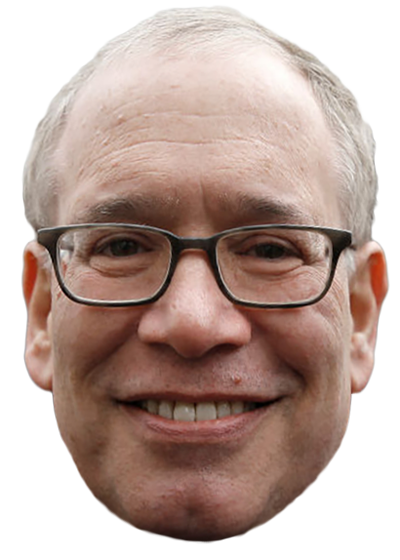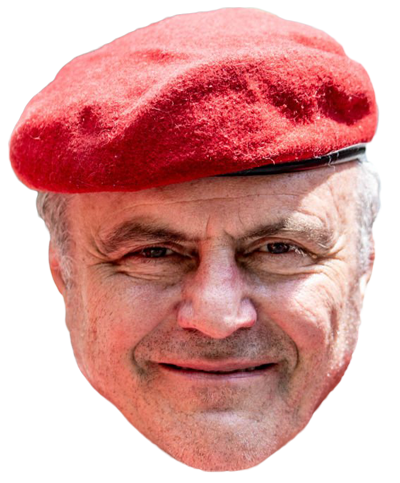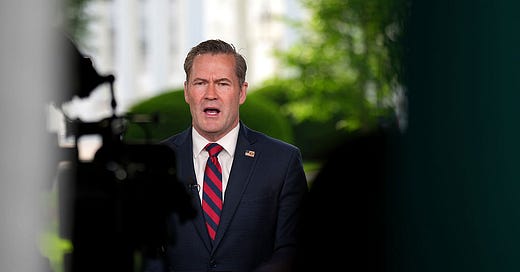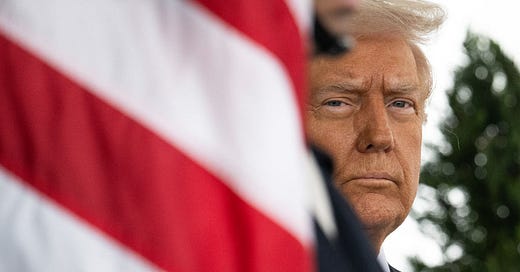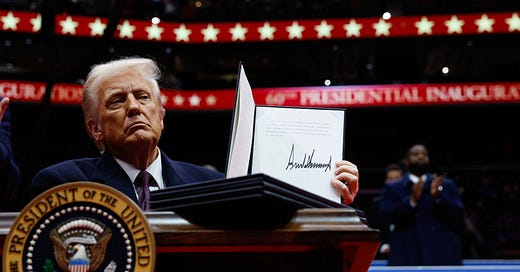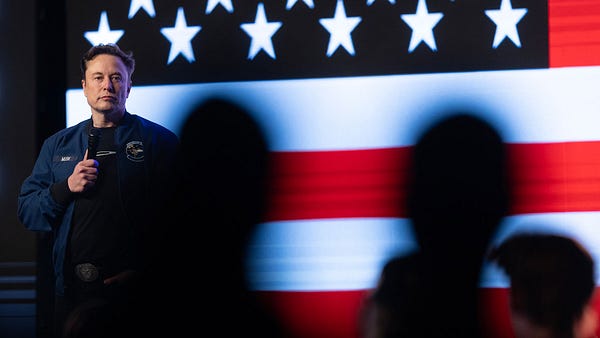
The Free Press

Welcome to New York City, home to $11 milk, at least 45,000 migrants, and one of the highest municipal tax rates in the country. There are so many rats we have a czar dedicated to their eradication. And the subway is partially run on 90-year-old technology with parts that are so rare, they can be found only on eBay.
And yet, only recently have New Yorkers started to demand change. For example, a poll last month found that nine in 10 city residents “strongly support” having the mentally ill involuntarily committed. Now, at least 11 mayoral hopefuls are claiming they could turn the city around. But not all of them have a shot at Gracie Mansion, according to the half-dozen political strategists I called up.
“You’re looking at four or five candidates who are actually viable,” Democratic strategist Trip Yang told me.
Regardless, all hopefuls first have to clear the primaries in June, which political consultant Stu Loeser told me is “not determinative” of the overall contest. “For the first time in decades, it’s not necessarily going to come down to the Democratic primary,” said Loeser, who previously served as former mayor Michael Bloomberg’s press secretary.
Instead, he predicts the real fight will come down to the general election this November. One possible scenario? Mayor Eric Adams on the ballot as an independent, socialist Zohran Mamdani running for the Working Families Party, local safety advocate Curtis Sliwa as the Republican, and former governor Andrew Cuomo as the Democrat. But one thing is for sure: All candidates are running a more “moderate” and “centrist” campaign, said Yvette Buckner, co-chair of The New Majority NYC, a group working to elect female candidates throughout the city.
“This is not 2021,” she said, of the time Democrats flexed their progressive bona fides. “Back then, candidates were applauded for talking about social justice issues, and now that’s seen as a negative.” (Although, in an early sign of this strategy backfiring, the most moderate Dem in the race, Adams, won that year.)
She added that the impact of President Donald Trump could also be felt in NYC, where he picked up more voters in all five boroughs compared to his previous two runs. “New York has definitely become more purple than it’s ever been before.”
None of the candidates—not even state assembly member Mamdani—is campaigning to “defund the police.” In fact, mayoral hopeful Scott Stringer, the city’s former comptroller who previously called for cuts to NYPD spending, is now promising to hire 3,000 more officers if elected. Strategist Ryan Adams told me that many New Yorkers want a candidate who can return the city to its former glory.
“The good old days were not that good—they were just better than now,” he said. “And better than now is what New Yorkers are voting on these days.”
Here, I break down the six major players in the race, and ask a half-dozen political insiders to rate each one’s chances of winning:
Eric Adams
Historically, there is no greater advantage than incumbency—that is, unless you’re Eric Adams, whose first term as mayor of New York City could be his last.
The sitting mayor is currently polling in third place, with only 6 percent of voters saying he has their support. He’s taken a hit in recent months after federal prosecutors charged him with accepting foreign bribes. A 57-page indictment claims he accepted more than $100,000 in free Turkish Airlines upgrades—including on a spontaneous trip to Ghana in 2021—and hotel stays. Polls show that more than half of New Yorkers want him to resign, although when I pounded the pavement in February to ask voters how they feel about the mayor, they largely told me: fuhgeddaboudit. “I’m sure some New Yorkers care; I’m just not one of them,” a janitor at Penn Station said.
Another factor that could work against Adams for some die-hard Democratic voters? His coziness with Trump, who has pushed the Manhattan DA to drop the charges against the 64-year-old mayor after he publicly supported the president’s crackdown on migrants.
Adams’s problem will be Manhattan, since that’s where “antipathy toward Trump is very high,” says Hank Sheinkopf, a Democratic consultant and former adviser to Bill Clinton. But his campaign is far from dead, especially if the mayor advances to the general election as an independent, a strategy he reportedly isn’t ruling out.
“If voters have a choice between an extreme left-winger and Adams, they’re going to pick Adams,” Sheinkopf added. “People who count Adams out are making a mistake.”
He adds that Adams’s pitch to voters is “really not that complicated.”
“The crime numbers are down. With job creation, the numbers are up. The rat problem is under control,” he said. “There’s a lot he can talk about.”
Chances of winning: 5/10. He may seem like a long shot, but Adams still has a solid base to work from. If he “continues to hold his base among the black and brown middle class” while keeping his “rock-solid support among Jews, and especially the Orthodox,” he’s in with a chance, says Loeser. “Black people and black hats—it’s not a bad place to work from.”
Andrew Cuomo
Once upon a time, New Yorkers loved the governor of New York. In 2020, Andrew Cuomo began hosting daily coronavirus briefings that turned him—just like his TV anchor brother—into a prime-time star. Captivated by his graphic-heavy PowerPoints on hospitalization rates, an army of fans even declared themselves “Cuomosexuals.” Then came the downfall in August 2021, when the governor resigned over mounting sexual harassment accusations. In January 2024, the Department of Justice announced it had found evidence the governor had sexually harassed 13 women. What’s more, his Covid policy of allowing infected patients to return to nursing homes where the virus spread and killed thousands of elderly residents, which his office then allegedly covered up, will come back to haunt him on the campaign trail.
“The attacks on Andrew Cuomo haven’t even started yet,” said Sheinkopf, who advised Cuomo on his 2014 reelection campaign. “The ads against him are going to be absolutely something people haven’t seen in a long time.” (A spokesperson for Cuomo said he has “always denied the allegations against him and five DAs . . . didn’t bring a single case forward.”)
And so, for now, Cuomo, 67, is ahead of the pack with a 23-point lead.
“His numbers are based on the best things people remember about him,” said a New York–based consultant who specializes in digital strategy. “And the next four months are going to be all about the worst things he’s ever done.”
Another problem: The former governor is running a “’90s-style campaign,” in which his communications team puts out “five-point plans” and email blasts on topics like crime and healthcare, according to a longtime Democratic strategist unaffiliated with the race.
“A five-point plan? Is he kidding? That might have worked a decade ago, but not anymore,” the strategist added. “Reporters just won’t play ball with that.”
Still, Sheinkopf says, Cuomo’s current lead in the polls makes him the one to beat.
“The numbers are just so directed in his favor,” he said. “And the city is wounded—there’s a sense that things are completely out of control and need immediate attention—and many see him as the person who can heal that wound.”
Chances of winning: 6/10. “If the election were held today, Andrew Cuomo wins,” said Sheinkopf. Yang, meanwhile, wagers that Cuomo has a 40 to 50 percent shot at winning. “He’s hot—he’s leading the polls,” he admitted. “But it all depends on if other candidates can spend tens of millions of dollars to bring those numbers down.”
Zohran Mamdani
If Cuomo is the man to beat, the candidate best positioned to take him down is Zohran Kwame Mamdani, who represents Astoria, Queens, in the New York State Assembly and is currently polling in second place at 18 percent. On Monday, he announced he was the first of any candidate this season to reach the cap of $3.8 million in public matching funds. (New York City contributes $8 for every $1 given to city candidates in small-dollar donations.)
“We are the first of any campaign in this entire cycle to accomplish this and we believe the fastest of any in New York City mayoral history,” Mamdani told a celebratory crowd outside City Hall Monday.
Mamdani has said his “organizing journey” began with his co-founding of the Students for Justice in Palestine chapter at Bowdoin College, Maine, the $85,000-a-year liberal arts college he attended. On October 13, 2023, just six days after Hamas terrorists committed the worst massacre of Jews since the Holocaust, police arrested Mamdani for disorderly conduct at an anti-Israel demonstration outside Senator Chuck Schumer’s house in Brooklyn. Mamdani has been unequivocal in calling Israel’s military response to Hamas a “genocide.” He’s often spotted in a keffiyeh and is a proponent of the Boycott, Divest, and Sanctions movement against Israel. In 2021, he organized a protest dubbed the “Defund State Violence Rally,” calling for local divestment from the NYPD and for the federal government to stop funding the Israeli military.
He kicked off the march with the chant: “When I say BDS, you say BLM.”
Sheinkopf called Mamdani “the emotional candidate of the moment.” He added that he’s tapped into anger, especially among the youth, toward corporations and Israel: “He’s the left-wing Trump.” Loeser, the Democratic strategist, agrees, saying Mamdani is running a “Trump-style campaign.”
“He’s 33, totally digitally native, and running a fully modern TikTok campaign,” Loeser said. “He’s absolutely a phenomenal communicator—and he’s also running a campaign that is about three or four things, not 40 things.”
If he is elected mayor, Mamdani has vowed to open a city-run grocery store in each borough, freeze rent on all rent-stabilized units, and provide free childcare for kids under five. Mamdani has also promised to raise the city's minimum wage to $30 an hour by 2030 (nearly double the current rate of $16.50). And he would arrest Israeli prime minister Benjamin Netanyahu if he were to step foot in New York City to show that “our values are in line with international law.”
His main accomplishment in the New York State Assembly, since his election in 2020, has been introducing the “Not on Our Dime!: Ending New York Funding of Israeli Settler Violence Act”—a bill that would target charities it says are “subsidizing Israel’s illegal settlement expansion and state violence against Palestinians” in the West Bank.
Despite being the son of a Columbia professor and an award-winning filmmaker, Mamdani has fashioned himself as a champion of the working class. In October, he won the endorsement of the New York City chapter of the Democratic Socialists of America, which wrote that his base includes “self-identified socialists, individuals radicalized by the genocide in Gaza, rent-stabilized tenants, Arab and Muslim American progressives, and the growing anti–Mayor Eric Adams/Governor Andrew Cuomo coalition.”
To Sheinkopf, and to many Jewish New Yorkers, Mamdani’s track record adds up to one thing: “He is an antisemite.”
“If this happens,” he said of a Mamdani election, “it’s the end of New York.”
Chances of winning: 6/10. In a race that can change on a dime, Mamdani could rise up from underdog status to champion. A Democratic consultant who has worked on presidential campaigns but refused to go on the record told me that Mamdani “had a lot of the hallmarks of a winner,” including his knack for going viral. The source almost whispered: “I think he’s going to win.”
Brad Lander
The city comptroller is hoping New Yorkers will forget about his far-left record: pushing to cut $1 billion from the NYPD budget in 2020, supporting bail reforms that spiked local crime, and advocating for a “housing first” approach to homelessness. Ever since Trump made inroads in NYC, Lander has been singing a more moderate tune. “Retail theft has become a crisis in New York City,” the candidate said in a video posted to X, highlighting the prevalence of stores locking up their merchandise amid a shoplifting spike.
But Lander is also spending a lot of time attacking his moderate or right-wing foes. Nearly every day, he wages a new online war against Trump, Elon Musk, Adams, or Cuomo—the last of whom he is pressing to return “every last penny” of the $28 million in taxpayer dollars that allegedly went toward defending sexual harassment accusations against him.
Sheinkopf says ranked choice voting in the city’s primaries could give Lander a chance. “Ranked choice voting makes it possible for anyone to have a victory,” he said. He added that Lander has an edge in the liberal “Brownstone Belt” in northwest Brooklyn, which includes the neighborhoods of Park Slope, Fort Greene, and Cobble Hill. “He’s pitching himself as a progressive and reasonable alternative to Cuomo. The question is, does that have value?”
Chances of winning: 2/10. If far-left politics are your thing, you have to ask yourself: Why would you ever go with Lander’s tired old brand over the renegade Mamdani?
Scott Stringer
Meet the political equivalent of the man your mom tells you to marry—smart, devoted, and maybe a little boring, but at least he cares about the right stuff: housing affordability, public safety, and waste management.
“The greatest city in the world is broken now,” Stringer, 64, told The City, adding that his “record of competence” as the city’s comptroller from 2014 to 2021 shows he can turn New York around.
His main campaign promise is to ease the cost of living in New York City, especially for families. Under his administration, he’s promising that no New York family would pay more than seven percent of their income toward childcare.
Sheinkopf says Stringer has one thing going for him: an endorsement from Representative Jerrold Nadler, who represents parts of Manhattan, including the Upper West Side, where Stringer built his base as the area’s state assemblyman from 1992 to 2005. “The West Side of Manhattan, which is one of the most concentrated and active voting areas in the country, will likely turn out for him because they have before,” he said.
The problem? Stringer—whose 2021 mayoral candidacy was tanked by accusations of sexual harassment—has also just seen five political clubs on the Upper West Side endorse his political rival Lander.
Chances of winning: 1/10. Unless the math of ranked choice voting magically works out in his favor, Scott is likely to be a second stringer.
Curtis Sliwa
The guy in the red beret is back. He’s currently the only Republican in the race—and likely the only candidate living with 17 cats in an Upper West Side studio apartment.
Even though he won only 28 percent of voters in the general election in 2021, there are two things working in his favor: the anger over the migrant crisis, and a backlash against rising crime. Sliwa, who founded the Guardian Angels in 1979 as a 24-year-old night manager at a McDonald’s in the Bronx, is considered strong on fighting crime. A recent spate of high-profile subway murders could boost his campaign, too.
“Let’s go out and hire cops,” he told NY1 this past December. “There’s not a community in all of New York City that feels safer.”
Sheinkopf says that New York Republicans “tend to get elected when there’s a crisis,” as was the case when voters put then-Republican Bloomberg into Gracie Mansion in 2001 on the heels of 9/11. And there’s no doubting the city is in disarray—66 percent of voters believe NYC is on the “wrong track,” according to January polling from the Manhattan Institute.
The Republican parties of all five boroughs are backing 71-year-old Sliwa, but there’s little evidence he can grab many independent and Democratic voters, despite his campaign website’s insistence that his campaign “is for the working people of New York City—the ones who power it every day.”
Chances of winning: 1/10. Sure, New Yorkers care about law and order. But will voters really put their money on a guy who tried to take his cat to his local polling place last time he was on the ballot? “Absolutely not,” said Sheinkopf. “His red beret has a better chance of getting elected than he does.”

